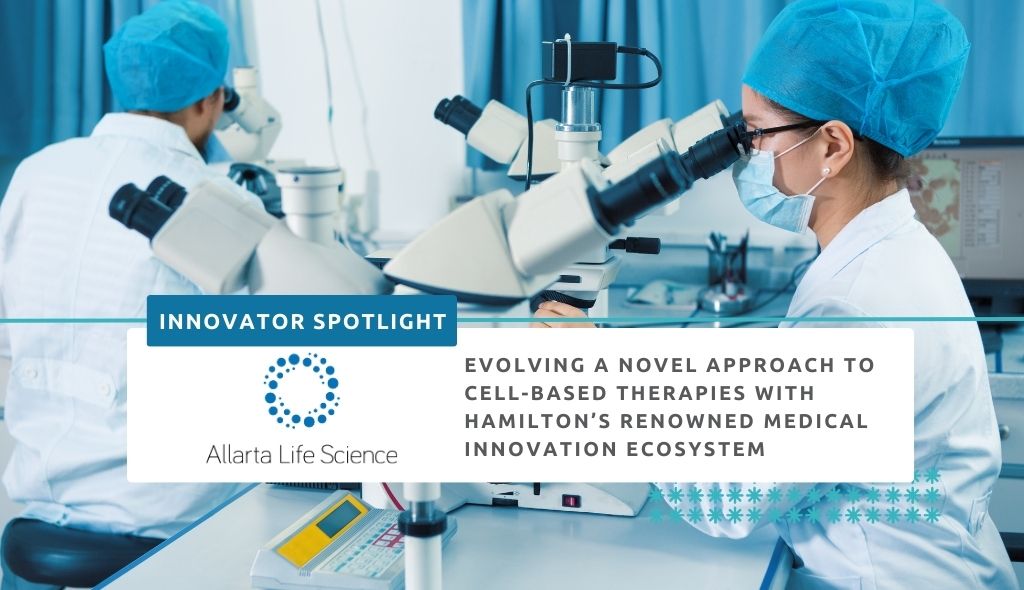A trained opera singer with an accomplished business background and a professor of chemistry, renowned globally for his research and expertise, may not appear to have anything in common. Yet a shared passion for innovation, a desire to make a difference and the knowledge of an unmet need in medical treatment options, led Maria Antonakos and Harald Stover to co-found Allarta Life Science Inc. (Allarta).
For patients suffering from diseases where their bodies fail to produce a specific enzyme or hormone, the effect on their health can be devastating. To make a bad situation worse, treatment options are limited. Cell-based therapies, based on the idea that cells can be trained to express substances that patients lack, offer hope. If these cells can be successfully transplanted, they can provide therapeutic benefits for a long time. However, a roadblock still exists due to the body’s natural immune response, which sees these helpful cells as foreign and destroys them. Allarta’s platform technology is a solution that physically protects therapeutic cells so patients can benefit from their treatment potential.
With strong early pre-clinical data, the company needed additional support to test and validate its solution. The founders turned to the Southern Ontario Pharmaceutical and Health Innovation Ecosystem (SOPHIE) program because they knew their innovation could significantly impact those suffering from a wide range of disorders, including metabolic diseases (e.g., diabetes), lysosomal disorders, rare blood disorders (e.g., hemophilia), and neurodegenerative disorders.
As Antonakos shares, “We had an existing partnership with McMaster University but needed additional support to validate what we were doing and to gather data to help us progress to additional studies. Life science innovation is sequential, and the SOPHIE program enables us to progress to larger, more advanced studies involving clinicians and users of our product. It is the essential next step to expand our research efforts and gather data for future fundraising and regulatory approval.”
Delivered by Hamilton’s Innovation Factory, in collaboration with the Synapse Life Science Consortium, the SOPHIE program launched in 2021 with a $6-million investment from the Government of Canada through the Federal Economic Development Agency for Southern Ontario (FedDev Ontario). The program provides emerging life science companies with the opportunity to leverage renowned research expertise and clinical capacity to accelerate their path to market.
Ultimately, Allarta hopes its SOPHIE project will help the co-founders reach their goal of licensing their technology to larger biopharma partners and enabling their technology to treat patients in hospitals and private facilities.
As David Carter, Chief Executive Officer of Innovation Factory states, “Over the next few years, Allarta could change the game on how cell-based technology is used to treat specific medical conditions, and we are thrilled to support that effort. Allarta is a perfect candidate for the SOPHIE program, having developed a high-potential product while in need of resources to complete the research necessary to seek regulatory approval and expedite the commercialization of its innovation.”
Since its founding in 2016, Allarta has worked extensively with the regional accelerator Innovation Factory and accessed a wide range of services including market research, business advisory support and training. Antonakos has also attended many of its events, specifically for women entrepreneurs, and continues to champion efforts to encourage networking and collaboration among female business owners. Innovation Factory also provided the Allarta team with many strategic introductions, forming partnerships that remain important today.
As the Chief Executive Officer and Chief Operating Officer of Allarta, Stover and Antonakos have a deep respect and appreciation for the Hamilton life sciences ecosystem and readily acknowledge it. “Hamilton provides an ecosystem for medical start-ups that is unmatched. It takes a village of people and skill sets, providing a range of technologies, research and talent to motivate others to push for progress— all of this exists here. Being in Hamilton has directly contributed to what we have achieved to date and the opportunities that have come our way,” notes Antonakos.
Today, Allarta has 20 employees, managing business, research, operations and science functions within the company with plans to further grow its team. Stover and Antonakos believe their molecular design approach to avoid immune suppression regimens has the potential to be a standard for cell-based therapy and have garnered interest from several strategic stakeholders.
Built on 30+ years of foundational research and meeting multiple requirements for a safe, scalable, robust and flexible cellular cloaking system, their science appears to be right.
